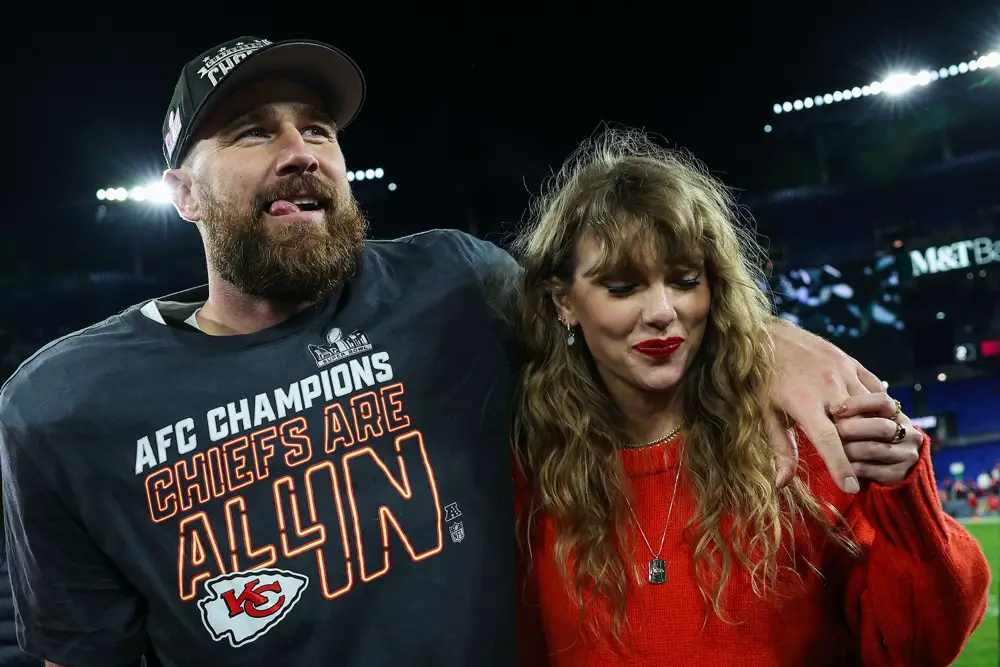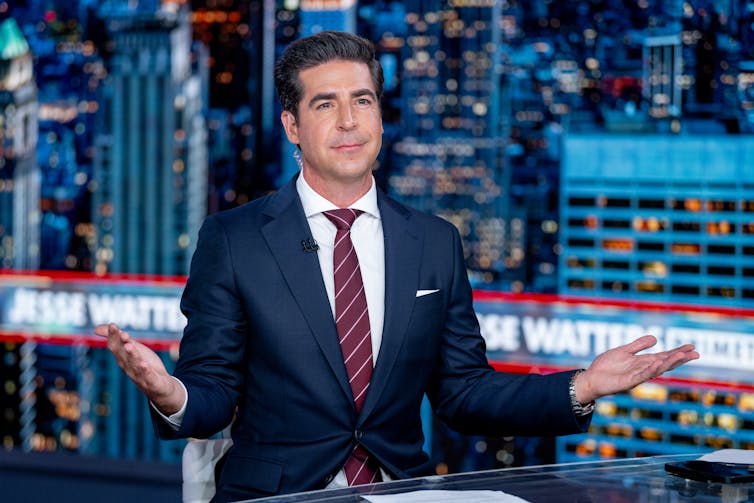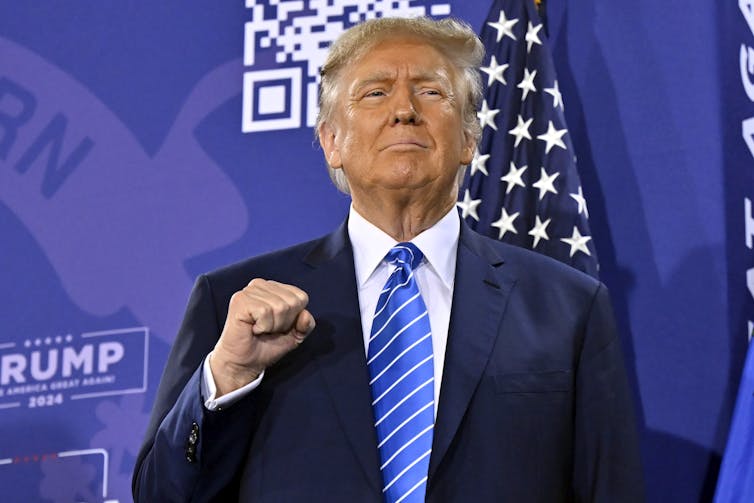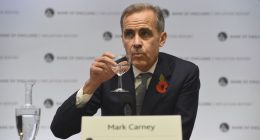
By Matt Harris
A pop icon falling for one of the NFL’s preeminent superstars may seem like a slice of Americana – a scene from a small-town high school magnified by a factor of 10 million.
But this is America in 2024 so, of course, nothing magical stays that way.
To be clear, public opinion data suggests that most Americans think Taylor Swift is good for the NFL. But with her beau Travis Kelce’s Kansas City Chiefs heading to a fourth Super Bowl in five years, and with Swift herself reportedly preparing for a journey across the globe to cheer him on in the big game, the right-wing talk machine has gone into overdrive.
Fox News host Jesse Watters suggested that Swift may be a Pentagon asset used to combat online misinformation. Former GOP presidential candidate Vivek Ramaswamy tweeted that he thinks Swift and Kelce are being artificially propped up by the media pending an upcoming Swift endorsement of Joe Biden. OAN referred to the couple as a “Massive Super Bowl Psy-op,” a brainwashing campaign designed to indoctrinate citizens to an elite agenda and away from religion.
The idea that the Swift-Kelce romance is some sort of deep-state plot is perhaps gaining some traction in far-right circles because it lines up with other right-wing conspiracy theories and the right’s broader agenda.
Swift’s NFL fandom
Swift has endorsed Democrats in the past, including Joe Biden in 2020. Kelce, while not politically outspoken, was featured in a Pfizer ad touting the COVID-19 vaccine.
Republicans are more likely than Democrats to believe, without evidence, that a secret group of rulers is controlling the world, as well as that vaccines cause autism. While there isn’t public opinion data yet on the theories from Fox News and the right-wing echo chamber that the Swift-Kelce romance is an elaborate left-wing scheme, it contains elements of similar conspiracies for which partisan splits exist.
And opinions on Swift herself are similarly polarized. The singer is viewed favorably among virtually all groups in America, although Republicans are the only group in which as many members dislike Swift as like her.
Taylor Swift has brought a unique element to NFL fandom. I haven’t seen fans of my hometown Buffalo Bills make signs denigrating a pop star since they thought Jon Bon Jovi wanted to buy the team and move it to Toronto in 2014.
Yet, as a political scientist, I know it’s an open question whether any of this matters politically.

Roy Rochlin/Getty Images
Oprah, Obama and celebrity endorsements
In the background of these conspiracy theories is the possibility that Taylor Swift could endorse Joe Biden. The Trump campaign is reportedly thinking about such a possibility, with allies talking behind the scenes about a “holy war” against Swift, brainstorming ways of painting her as a left-wing celebrity advancing an elite Democratic agenda.
But how much would such an endorsement matter?
In political science literature, a hallmark case of the power of celebrity endorsements is Oprah Winfrey’s 2008 backing of Barack Obama. Winfrey’s endorsement occurred during a primary in which he was taking on a more well-known opponent, Hillary Clinton.
Winfrey’s endorsement, wrote the authors of a prominent study of the case, led participants in the study “to see Obama as more likely to win the nomination and to say that they would be more likely to vote for him.” In other words, it helped advance public perceptions of Obama’s viability as a candidate.
A Swift endorsement of Biden would be different.
Swifties are largely suburban and young. Almost half are millennials, and over 10% belong to Gen Z. They represent a slice of the youth vote that candidates have attempted to court for decades, and the suburbs are increasingly a battleground in the country’s urban-rural divide. A Swift Instagram post in 2023 helped lead to 35,000 new voter registrations – and her ability to generate funds could also be invaluable to Biden.
But an Oprah-like effect is less likely for a Swift endorsement of Biden, who is running as an incumbent without a serious primary challenger and his status as the Democratic nominee is certain.
Further, polling demonstrates that the effect of a Swift endorsement could be essentially a net wash, with 18% of the public saying they’d be more likely to support a Swift-backed candidate and 17% saying they would be less likely to support Swift’s favored choice.
Even those numbers might be affected by partisan-motivated reasoning, where a person’s party identification colors their perceptions of information. Swift’s prior backing of Democrats and perceived liberalism might cause her supporters and detractors to use polling questions asking about a potential Swift endorsement to express support or disfavor of her, regardless of how her endorsement would actually influence their choice.

David Becker/Getty Images
Not just a love story
Essentially, a Swift endorsement might matter at the margins, but there are many, many other factors at play in a general election. That’s especially true in an election between two men who have both served as commander in chief, a rarity in American politics.
A Swift endorsement, then, is perhaps less important in and of itself than Donald Trump’s response to a Swift endorsement of Biden.
Public opinion polling in the wake of Trump’s Access Hollywood remarks in 2016 showed that majorities of both women and men believed Trump had little or no respect for women. But Trump actually improved his numbers among women voters in 2020.
A Swift endorsement of Biden could bring out some of Trump’s worst impulses. Perhaps the effect of his response on how voters view him could be more important than her endorsement of Biden.
![]()
Matt Harris is Associate Professor of Political Science at Park University.
The Conversation arose out of deep-seated concerns for the fading quality of our public discourse and recognition of the vital role that academic experts could play in the public arena. Information has always been essential to democracy. It’s a societal good, like clean water. But many now find it difficult to put their trust in the media and experts who have spent years researching a topic. Instead, they listen to those who have the loudest voices. Those uninformed views are amplified by social media networks that reward those who spark outrage instead of insight or thoughtful discussion. The Conversation seeks to be part of the solution to this problem, to raise up the voices of true experts and to make their knowledge available to everyone. The Conversation publishes nightly at 9 p.m. on FlaglerLive.







![Michael Weatherly and Cote de Pablo Are Back in ‘NCIS: Tony & Ziva’ [PHOTOS]](https://celebjam.com/wp-content/uploads/2025/04/Michael-Weatherly-and-Cote-de-Pablo-Are-Back-in-‘NCIS.webp-260x140.webp)


